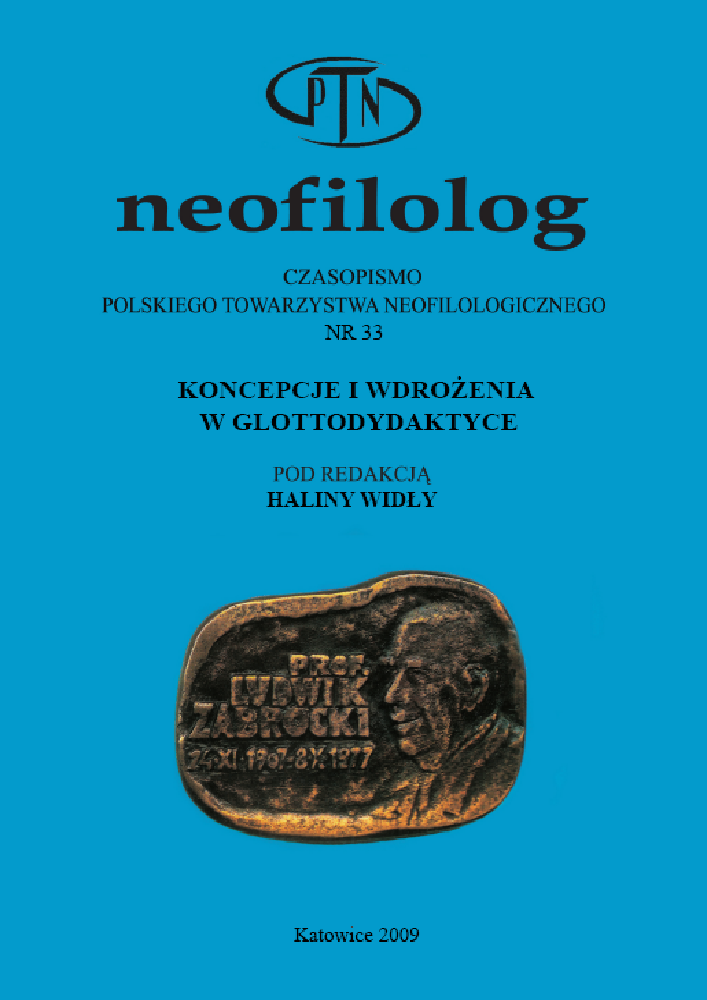Abstrakt
The article discusses kinds of verbal reports and their characteristic features. More specifically, it focuses on: a) the validity of particular types of verbal reports and the data these are likely to provide, b) a quite difficult distinction between introspection and retrospection in researching reading, and c) the characteristic features and limitations of think-aloud protocols (categorized as introspective verbal report), especially if used to investigate the concrete reading format of gapped-text.
Bibliografia
Afflerbach, P. P. 1990. « The influence of prior knowledge on expert readers’ main idea construction strategies ». Reading Research Quarterly 25 : 31 – 46.
Carver, R. 1992. « Effect of prediction activities, priori knowledge, and text type upon Mount comprehended: using rauding theory to critique schema theory research ». Reading Research Quarterly 27 : 164 – 174.
Cohen, A. D., Upton, T. A. 2007. « ‘I want to go back to the text’: response strategies on the reading subtest of the new TOEFL ». Language Testing 24 : 209 – 250.
Conrad, F., Blair, J., Tracy, E. 1999. « Verbal reports are data! A theoretical approach to cognitive interviews ». Proceedings of the Federal Committee on Statistical Methodology Research Conference, www.bls.gov/osmr/abstract/st/st990240.htm DW 19.07.2009.
Ericsson, K. A., Simon, H. A. 1993. Protocol analysis: Verbal reports as data. Cambridge : Bradford books/MIT Press.
Garner, R., Wagoner, S., Smith, T. 1983. « Externalizing question-answering strategies of good and poor comprehenders ». Reading Research Quarterly 18 : 439 – 447.
Hosenfeld, C. 1977. « A preliminary investigation of the reading strategies of successful and nonsuccessful second language learners ». System 5 : 110 – 123.
Jimenez, R. T., Garcia, G. E., Pearson, P. D. 1996. « The reading strategies of bilingual Latina/o students who are successful English readers: opportunities and obstacles ». Reading Research Quarterly 31 : 90 – 112.
Konieczna, A. 2009. The use of strategies in gapped-text reading task, referat konferencyjny, 3rd International May Conference on English Studies, Kraków [w druku].
Matsumoto, K. 1993. « Verbal report data and introspective methods in second language research: state of the art ». RELC Journal 24 : 32 – 60.
Olshavsky, J. E. 1976 – 1977. « Reading as problem solving: an investigation of strategies ». Reading Research Quarterly 12 : 654 – 674.
Pressley, M., Afflerbach, P. 1995. Verbal protocols of reading: the nature of constructively responsive reading. Hillsdale : Lawrence Erlbaum Associates.
Pressley, M., Hilden, K. 2004. « Verbal protocols of reading » (w) Literacy research methodologies (red. N. K. Duke i M. H. Mallette). New York : The Guilford Press.
Russo, J. E., Johnson, J. J., Stephens, D. L. 1989. « The validity of verbal protocols ». Memory and Cognition 17 : 759 – 769.
Licencja
Prawa autorskie (c) 1970 Anna Konieczna

Utwór dostępny jest na licencji Creative Commons Uznanie autorstwa – Bez utworów zależnych 4.0 Międzynarodowe.
Przedstawiany utwór (artykuł) upubliczniany jest na podstawie umowy z autorem i na licencji Creative Commons Attribution-NoDerivatives 4.0 International (CC BY-ND 4.0).
Użytkownicy mają obowiązek podania wraz z rozpowszechnionym utworem, informacji o autorstwie, tytule, źródle (odnośniki do oryginalnego utworu, DOI) oraz samej licencji;
- bez tworzenia utworów zależnych,
- utwór musi być zachowany w oryginalnej postaci.
Uniwersytet im. Adama Mickiewicza w Poznaniu zachowuje prawo do czasopisma jako całości (układ, forma graficzna, tytuł, projekt okładki, logo itp.).
